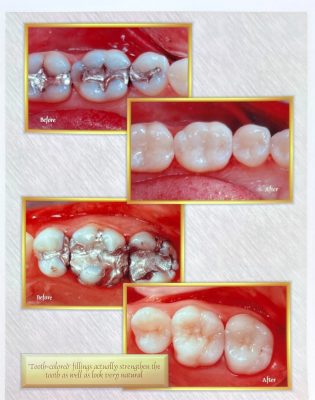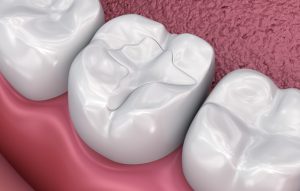Dental Fillings: Don’t Let Cavities Go Untreated
Cavities are more than just minor inconveniences; they can lead to serious dental issues if left untreated. Dental fillings offer a simple and effective solution to halt the progression of decay and restore the integrity of your teeth.
Our Northridge dentist, Dr. Kevin H. Gropp, offers dental fillings to help you say goodbye to the discomfort and potential complications of untreated cavities. To schedule your appointment, contact our dental office today by calling (818) 709-8645. We also proudly serve patients coming from Granada Hills, Chatsworth, and North Hills.
Dealing With Tooth Decay – Our Northridge Dentist Explains
Tooth decay, also known as dental caries, is a common oral health issue that affects people of all ages. It occurs when bacteria in the mouth break down food particles, especially sugars and starches, producing acid. This acid attacks the tooth enamel, causing it to lose minerals and eventually leading to cavities.
Preventing tooth decay is crucial for maintaining a healthy smile. Practicing good oral hygiene habits, such as brushing your teeth with fluoride toothpaste and visiting the dentist regularly, can significantly reduce the risk of decay. Fluoride treatments are also beneficial as they help remineralize the tooth enamel, making it more resistant to acid attacks. By taking these preventive measures, you can protect your teeth from decay and enjoy better oral health.
Diagnosing Cavities
Cavities can be tricky to spot, especially in their early stages. That’s why regular dental check-ups are essential. Dentists use a combination of visual examinations and X-rays to diagnose cavities accurately. There are three main types of cavities: smooth surface, pit and fissure, and root cavities. Each type affects different areas of the tooth and requires specific treatment approaches.
Early detection of tooth decay is vital for effective treatment. Dentists often use the D1-D5 classification system to determine the extent of decay. This system helps in planning the appropriate treatment based on the size and location of the cavity. By catching cavities early, you can prevent more extensive damage and maintain better oral health.
What Are Dental Fillings?
Dental fillings are a type of dental restoration that restore and repair teeth affected by decay or damage. When a tooth develops a cavity (dental caries), a small hole caused by decay, a dental filling is used to fill the cavity and prevent further decay or infection. A dental filling can also be used to repair teeth that have been damaged due to trauma or wear.
With dental fillings, our dentist can help patients with:
- Restoring the structural integrity of the tooth, preventing further decay and damage.
- Alleviating tooth sensitivity and pain associated with cavities or damaged teeth.
- Improving the appearance of the tooth, especially when tooth-colored materials are used.
- Preserving the tooth’s function and aesthetics for years to come.
Types of Dental Fillings: Composite Resin Fillings
There are various types of dental filling materials, some not as used as others. Types of dental filling materials may include:
- Composite Fillings: Composite fillings, also known as tooth-colored fillings, are made of a mixture of plastic and glass particles. They’re tooth-colored and blend in with the natural teeth, making them a popular choice for visible areas of the mouth. Composite fillings bond directly to the tooth structure, providing good support. A composite filling is less durable than amalgam fillings and may need to be replaced over time. Tooth-colored composite resin fillings are popular for their aesthetic appeal and typically cost more than amalgam fillings.
- Amalgam Fillings: Also known as silver fillings, these are made of a mixture of metals, including silver, tin, copper, and mercury. They’re durable and have been used for many years. However, their silver color makes them more noticeable, which can be a concern for some patients. Silver amalgam fillings typically range from $180 to $350 when insurance is involved.
- Ceramic Fillings: These fillings are made of porcelain or ceramic materials. They’re tooth-colored and offer excellent aesthetics. Ceramic fillings are highly resistant to staining and are well-suited for areas of the mouth that require strength and durability.
- Gold Fillings: These are made of gold alloy, which is a mixture of gold and other metals like silver and copper. They’re highly durable and can last for many years. Gold fillings are custom-made in a dental laboratory and are more expensive compared to other types of fillings.
- Glass Ionomer Fillings: These fillings are a mixture of acrylic and glass materials. They release fluoride, which helps to prevent further tooth decay. Glass ionomer fillings are often used in children or for non-load-bearing areas of the teeth.
Benefits of Dental Fillings
Dental fillings offer several benefits for oral health and overall well-being. Some of the key advantages include:
- Decay removal
- Tooth preservation
- Restored function
- Pain relief
- Improved aesthetics
- Durability
- Quick procedure
- Minimal Sensitivity
- Prevents tooth fractures
- Cost-effective
- Easy dental care
Do You Need Dental Fillings for Tooth Decay?
To determine your need for dental fillings, our general dentist will evaluate the following:
- Presence of a Cavity: Dental fillings are primarily used to treat cavities. The first thing we’ll look for is the existence of a cavity in a tooth. X-rays and a visual examination help our dentist identify the extent of the decay. Early tooth decay often has no symptoms, making regular check-ups essential for early detection.
- Tooth Structure: The extent of the damage to the tooth structure is crucial. Dental fillings are typically recommended for minor to moderate decay. If the decay is too extensive, other treatments like dental crowns or root canals may be necessary.
- Patient’s Overall Health: A patient’s overall health and medical history are considered. Certain medical conditions or medications may affect the choice of filling material or the patient’s ability to undergo the procedure.
- Allergies or Sensitivities: Some individuals may have allergies or sensitivities to specific dental materials used in fillings. Dentists must consider these factors when selecting the appropriate filling material.
- Adequate Tooth Structure for Support: There must be enough healthy tooth structure remaining to support the filling. If the tooth is severely compromised, you may not be a suitable candidate for a filling, and alternative treatments may be necessary.
- Patient’s Preferences: Our dentists will also take into account the patient’s preferences, especially if there are cosmetic concerns. Tooth-colored composite fillings are preferred by many patients for aesthetic reasons, but other options like amalgam or gold fillings are also available.
- Budget and Insurance: Financial considerations play a role in determining candidacy. Patients should discuss the cost of the filling and whether their dental insurance covers the procedure.
- Alternative Treatments: We may also discuss alternative treatments with the patient, especially if a filling isn’t the most suitable option. This could include dental crowns, inlays, onlays, or even tooth extraction in severe cases.
Preparing for Your Appointment
If you’re experiencing tooth pain or sensitivity, it’s important to schedule an appointment with your dentist as soon as possible. Being prepared for your visit can help ensure you get the best care. Start by providing your dentist with your complete medical and dental history, including any medications you’re currently taking.
Make a list of questions to ask your dentist, such as:
- What caused my tooth decay?
- What are my treatment options?
- How can I prevent future cavities?
Also, note any symptoms you’re experiencing, including the location and severity of your tooth pain. Don’t hesitate to discuss any concerns or questions you may have with your dentist. Being proactive about your dental health can lead to better outcomes and a healthier smile.
The Dental Filling Procedure
Our Northridge dentist will start by numbing the area around the tooth to ensure you’re comfortable during the procedure. Next, we’ll use a dental drill or laser to remove the decayed portion of the tooth, leaving a clean and prepared area. Once the decay is removed, Dr. Kevin Gropp will carefully shape the cavity to create space for the filling material. The chosen filling material, such as composite resin, amalgam, or porcelain, is then placed into the prepared cavity and shaped to match the natural contours of the tooth. The filling is hardened using a curing light.
After ensuring the proper fit and bite alignment of your newly filled tooth, we’ll make any necessary adjustments. The final step involves polishing the filling to achieve a smooth and natural appearance. The result is a restored tooth that’s both functional and aesthetically pleasing while preventing further decay and maintaining the overall oral health of the patient.
Aftercare and Prevention
After undergoing a dental filling procedure, maintaining good oral hygiene is essential to prevent further tooth decay. Brush your teeth with fluoride toothpaste and visit your dentist regularly for check-ups. These practices help keep your teeth strong and healthy.
To further prevent tooth decay, consider using sealants to cover the chewing surfaces of your teeth. Sealants provide an extra layer of protection against decay. Older adults should also prioritize good oral hygiene and regular dental visits to maintain their dental health.
By understanding tooth decay, diagnosing cavities early, preparing for your appointment, and practicing good oral hygiene habits, you can effectively prevent tooth decay and maintain a healthy, beautiful smile.
How Much Do Dental Fillings Cost?
On average, a dental filling costs between $180 to $350. However, certain factors will affect the total cost of your filling treatment, such as the type of filling material, the location of the dental practice, and the complexity of your procedure. As tooth decay advances, it can lead to more complex and costly treatments. In most cases, dental insurance covers at least a portion of dental filling expenses.
Frequently Asked Questions
Do dental fillings cause tooth sensitivity?
The process of getting a dental filling is usually painless. Before beginning the procedure, the dentist will administer a local anesthetic to numb the area around the tooth. This ensures that you won’t feel any pain during the cavity removal or filling placement. Some patients might experience mild discomfort or sensitivity after the anesthesia wears off, but this is temporary and can be managed with over-the-counter pain relievers.
How long do dental fillings last?
The lifespan of a dental filling varies depending on factors such as the type of material used, the location of the filling, and the individual’s oral hygiene habits. Amalgam fillings can last for decades, while composite resin fillings might need replacement after around 5 to 10 years. Regular dental check-ups can help monitor the condition of your fillings and detect any signs of wear or damage, ensuring timely maintenance or replacement if necessary.
Can I eat after getting a dental filling?
It’s generally recommended to wait at least 24 hours before eating hard or sticky foods after receiving a dental filling, especially if a local anesthetic was used. This waiting period helps ensure that the filling sets properly and allows the anesthesia to wear off completely, preventing accidental biting of the cheek or tongue.
What should I do if my filling falls out?
If a dental filling falls out, it’s important to contact your dentist as soon as possible for an appointment. In the meantime, avoid eating on that side of your mouth and keep the area clean. You can use a temporary dental cement from a pharmacy to cover the cavity if needed, but this is not a permanent solution. Your dentist will assess the situation and determine the best course of action to restore the filling.
Restore Your Smile and Oral Health Today!
Dental fillings play a vital role in restoring the health, function, and aesthetics of our teeth. Whether it’s addressing cavities, reinforcing tooth structure, or enhancing smiles, the process of getting a filling is a routine yet essential dental procedure. If you’re experiencing any dental discomfort or suspect you might need a filling, don’t hesitate to reach out to our dentist for a thorough examination.
Call our Northridge dental practice today at (818) 709-8645 to learn more about tooth decay treatment and the dental filling procedure, and take the first step toward maintaining your radiant smile and overall well-being. We’re happy to accept new and returning patients from the San Fernando Valley, Northridge, and the surrounding Los Angeles areas, such as Granada Hills, Reseda, and Lake Balboa, CA.



